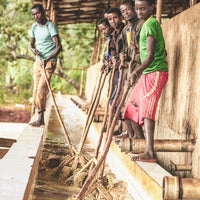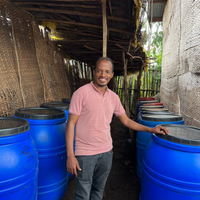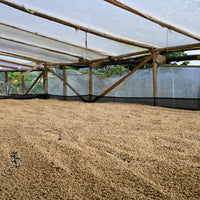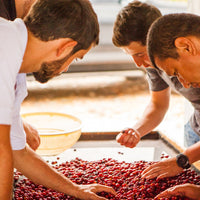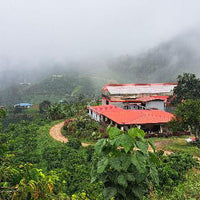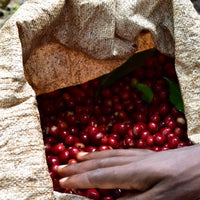Origin : Colombia
Region: Pitalito, Huila
Altitude: 1780 meters above sea level
Producer: Nestor Lasso Zuniga
Variety: Sidra Bourbon
Process: Special Prep. Washed/48hr+36hr Ferment
Tasting Notes: Soft, delicate and complex with notes of pink sherbet, lilac, rose and elderflower jelly.
Finca Las Flores is one in a group of five farms that have banded together for the greater success of each producing family. This tight-knit collective in the Pitalito area collaborates closely in everything from agronomy and processing innovations, through to marketing networks and community get-togethers.
Las Flores began with 2 hectares mixing Caturra and Colombia variety coffee trees (some 18,000 in total planted) when Edilberto Vergara and Nubia Ayure arrived, moving the family from Cundinamarca to Acevedo in 1990. As their three boys grew up, they became instrumental in the Las Flores production. Eldest Carlos with youngest Diego runs most logistics for the farm on the ground. Whilst middle son, Johan, has brought his experience from working with other celebrated producers to direct processing decisions at Las Flores and having an extraordinary impact on the qualities being achieved.
Since 2006, the family have gradually built on their traditional beginnings with the introduction of alternative varieties for the region, such as Chiroso, Java, Pacamara, Pink Bourbon and Tabi. Currently, Las Flores spans over 14 hectares with 90,000 trees, whilst always retaining a dedicated natural reserve to protect its biodiversity.
Sidra bourbon (also goes by Sydra or Sidra) is one of the latest in Vergara’s experimental varieties. Thought to have its origins in Ecuador as a natural mutation of Red Bourbon and Typica. In the cup, we experience both the body and sweetness of red bourbon as well as the complexity and acidity associated with Typica.
Loosely characterised as washed, Johan has implemented advanced processing techniques to amplify the intrinsic characteristics of the variety. Cherries at optimal ripeness (averaging 22 degrees brix) were hand selected and then held for 18 hours in permeable polypropylene fibre bags to begin cherry oxidation. They were then transferred into 200L sealed plastic barrels without water for 36 hours of anaerobic fermentation. Cherries were then floated to remove inferior fruit and impurities before being pulped back into the plastic barrels without water for a further 48 hours of anaerobic fermentation. Finally, fermentation is ceased and the remaining mucilage is removed by washing coffee with water heated to 35 degree Celsius (known as thermal shock processing). Drying of parchment coffee took 12 to 15 days on raised beds under a parabolic shade canopy, purpose-built to protect micro-lots from direct sun and maximise each lot’s full expression of extraordinary qualities.


